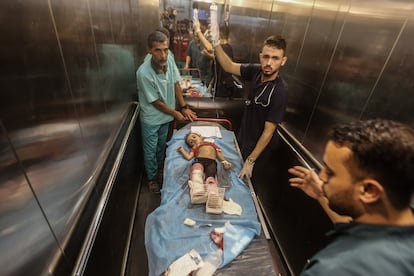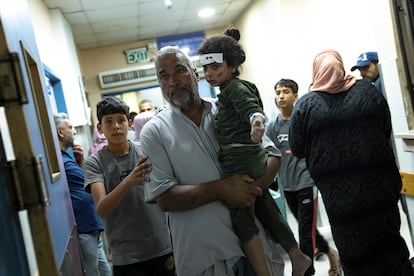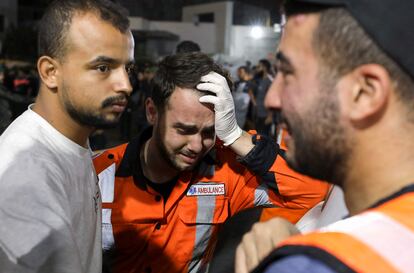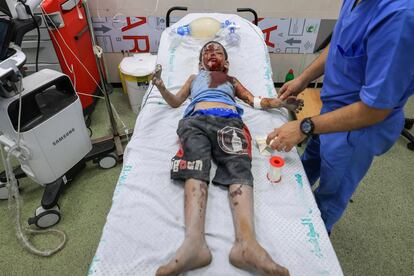Running out of fuel, Gaza hospitals warn of impending collapse
Health centers barely have any drinking water, food, medicine or beds left to care for the injured, whose numbers keep rising as a result of ongoing Israeli airstrikes

Hospitals in the Gaza Strip are on the brink of collapse. Even as hundreds of wounded people enter the health centers every day, the complete blockade by land, sea and air that Israel has imposed after Hamas’ attack on October 7 has left this enclave without electricity, water, food or medicine supplies.
“Fuel reserves in all Gaza hospitals are expected to last about 24 hours longer,” the U.N. Office of Humanitarian Affairs (OCHA) said on Monday. And without fuel, “the lives of thousands of patients” are at risk, especially those admitted to intensive care units, newborns in incubators and patients requiring dialysis. “Everything that is being done now is aimed at saving lives,” without the possibility of carrying out other types of medical procedures, points out Mohamed Abu Mughaisib, deputy medical coordinator of a team of Doctors Without Borders working in Gaza, in an audio released by the NGO.

The 3,500 beds that the U.N. estimates that all health centers in the Strip have are, furthermore, not enough to care for all patients. In just 10 days, nearly 10,000 people have been injured as a result of missile attacks by the Israeli Armed Forces, which have killed more than 2,800 people. Only the most urgent cases are being operated on due to lack of resources, according to doctors working in Gaza cited by the Reuters agency.
The spokesman for the Gaza Ministry of Health, Ashraf Al Qidra, has asked Gazans to go to Al Shifa hospital, the largest in the Strip, to donate blood. “If the hospital stops working, the entire world will be responsible for the hundreds or thousands of patients who depend on our service,” he said on Monday. The medical center, located in the capital and where tens of thousands of civilians are taking refuge, has just buried 100 bodies because they did not fit in the morgue. Painkillers have also run out and there are hardly any medications left even in pharmacies, according to staff in the Doctors Without Borders area.
Al Shifa is located in the northern half that the Israeli army has warned its 1.1 million inhabitants to evacuate ahead of an expected ground offensive. This area includes 22 medical centers. One of these is Kamal Adwan Hospital. The staff has not abandoned their posts because leaving “would mean death” for the seven newborns who depend on respirators and for “other patients under care,” the head of pediatrics, Hussam Abu Safiya, told the Associated Press agency.

More than half of the inhabitants of the north, some 600,000, had fled southwards by Monday for fear of an Israeli invasion, according to U.N. data. Among them are few healthcare workers, who “have overwhelmingly chosen to stay back [in hospitals] and honor their oaths as healthcare professionals to ‘do no harm,’ rather than risk transporting their critically ill patients for hours,” said OCHA, which considers this transfer impossible under safe conditions.
“The situation is very difficult. Today, for two hours, we were looking for drinking water,” laments Dr. Abu Mughaisib. Although there is still food, hospitals “can barely function” and medicines “are running out.”
Death warrant
The World Health Organization (WHO) has highlighted the pressure that the situation puts on the fewer hospitals in the south. Not only are they “already at maximum capacity,” treating wounded people from the airstrikes and suffering from the same shortages of medical supplies, water, electricity and fuel, but they will also now have to accept patients from the medical centers in the north. “Forcing more than 2,000 patients to relocate to southern Gaza, where health facilities are already running at maximum capacity and unable to absorb a dramatic rise in the number of patients, could be tantamount to a death sentence,” said the WHO in a statement.
This is the case of Nasser Hospital, in the city of Khan Yunis, in southern Gaza, where the intensive care room is full of injured people, especially children under three years of age. It has received hundreds of seriously injured people from the impact of the missiles, there are 35 patients in the ICU and 60 who need dialysis, but the hospital only has fuel to function until the end of the day, according to the director of its emergency department, Mohamed Qandil. “And if it ends, the entire health system collapses [...] All of these patients are at risk of dying if the electricity goes out,” he told AP.

Meanwhile, the flow of arrivals to medical centers, whether wounded people or those seeking refuge from Israeli airstrikes, does not stop, as confirmed by the Palestinian Red Crescent (PRCS). “Hospitals have a very limited number of days in terms of their capacity to operate and care for the wounded,” they said in a statement, warning that the Al Quds medical center in Gaza City, and Al Amal in Khan Younis [in the south], are also running out of fuel, medicine and medical supplies, as well as food and water for staff, volunteers and patients.
The PRCS on Sunday condemned the intensification of bombings in the vicinity of Al Quds hospital, “with around five attacks in less than a minute.” It also said that Israeli forces have bombed ambulances trying to pick up wounded people in Gaza. At least four people from this organization, two health workers and two volunteers, have been killed since the conflict began.
Sign up for our weekly newsletter to get more English-language news coverage from EL PAÍS USA Edition
Tu suscripción se está usando en otro dispositivo
¿Quieres añadir otro usuario a tu suscripción?
Si continúas leyendo en este dispositivo, no se podrá leer en el otro.
FlechaTu suscripción se está usando en otro dispositivo y solo puedes acceder a EL PAÍS desde un dispositivo a la vez.
Si quieres compartir tu cuenta, cambia tu suscripción a la modalidad Premium, así podrás añadir otro usuario. Cada uno accederá con su propia cuenta de email, lo que os permitirá personalizar vuestra experiencia en EL PAÍS.
¿Tienes una suscripción de empresa? Accede aquí para contratar más cuentas.
En el caso de no saber quién está usando tu cuenta, te recomendamos cambiar tu contraseña aquí.
Si decides continuar compartiendo tu cuenta, este mensaje se mostrará en tu dispositivo y en el de la otra persona que está usando tu cuenta de forma indefinida, afectando a tu experiencia de lectura. Puedes consultar aquí los términos y condiciones de la suscripción digital.








































